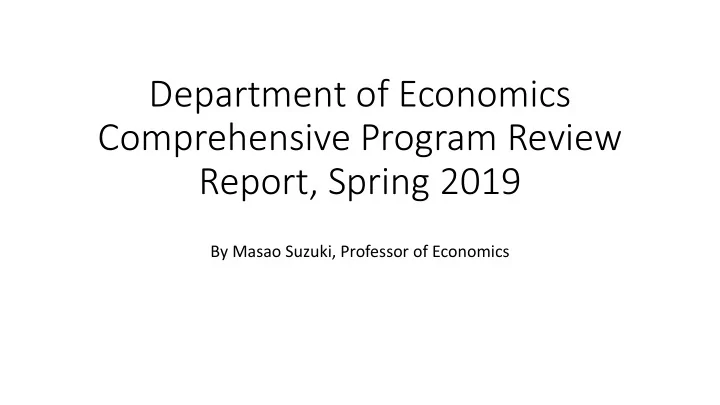

Department of Economics Comprehensive Program Review Report, Spring 2019 By Masao Suzuki, Professor of Economics
Enrollment 2013-2018* • Economics department enrollment* -11.3% • Skyline College enrollment* -18.7% • Economic department headcounts* down across race and gender except for Asian American and Pacific Islander • Skyline College headcounts* down across race and gender (without exception)
The Asterisk (*) and projections • Figures on previous page for face-to-face classes only. We have a new online instructor and have changed from hybrid to online this year. • Projections: for 2018-2019, I expect enrollment in face-to-face classes to continue to decline by a small amount. However I expect the online enrollment to go up significantly as we have added one more section of online classes just this semester and plan to also offer an additional section in the Fall. • (Not in CPR) The online instructor has expressed support for expanding a statewide system of proctoring centers…
Classes Go…. • This year the Economics Department deleted two classes: • Econ 111, The Economy Today, was developed as an introductory course for non-majors. It was offered twice but both times had to be cut because of low enrollment. • Econ 310, the Political Economy of Asia, was developed as part of an Asian Studies initiative. However it was never taught because of staffing constraints and just this year the Business division decided to drop the Asian Studies major.
Classes to come! • The Economics Department is working on the development of an Economics of the Environment course. • The class would complement the Environmental Science class and provide another class for students interested in the environment and sustainability issues. It would also provide a third class in economics. • The economic impact of climate change is becoming a more and more prominent issue. For example the Federal Reserve Bank of San Francisco just released a study on climate change: https://www.frbsf.org/economic-research/publications/economic- letter/2019/march/climate-change-and-federal-reserve/ • Hopefully the class can also aid the social justice and other initiatives.
And classes remain… • The two main (and indeed for the last twenty years, only) classes in the Economics Department are Econ 100, Macroeconomics, and Econ 102, Microeconomics. • We offer both face-to-face classes in both day and evening as well as online classes, during fall, spring, and summer. • I wanted to note that the classes are not sequenced. We used to have a 100 – 102 sequence but dropped this to align with CSM and Canada. • These classes support business majors (where they are required), as well as other majors, and General Ed transfers (Social Science).
Economics Transfers • Economics department does help a large number of students to transfer to State Universities, U.C.s, and others. • Relatively few transfer in Economics, with some of our best students going to U.C. Berkeley in Business, Math, and English. • We are proud that some come back to Skyline (but not for Economics classes) but for other classes and to be tutors!
Economics AT Degree! • One of the projects of the Economics Department during the CPR review period (2013-2018) was the development of an Economics AT degree. • There was a (very) long delay at the state level (over a year) but the AT degree has been approved by the state and should be implemented in the Fall of 2019! • The Economics Department also worked to align our classes with the requirements needed for the development of Business Associate Transfer degrees.
Successes and Challenges • Success Rates (for face-to-face classes): • In 2018 change 2013-2018 • Economics 72.9% + 6.3 percentage points • Skyline 75.2% + 4.2 percentage points • Much of Econ Dept improvement was because of fewer withdrawals: • Withdrawal Rates (face-to-face classes) • Economics 10.9% – 5.9 percentage points • Skyline 12.3% – 1.8 percentage points.
Economics Depart Success Rates
Large variations in success • There is a large variation between the highest and lowest scores by ethnicities, although there is improvement: Total 2013-18 2018 Total 2013-18 2018 success success withdrawal withdrawal Asian American 76% 78% 11% 8% Pacific Islander 45% 63% 38% 31%
Resources • The Economics Department is well-resourced with an full-time professor and three experienced adjuncts, as well as support with tutoring. • Despite the enrollment decline we maintain a strong load of 592, almost 20% higher than the college average of 506 (2018 figures). • Strong online enrollment has allowed us to add a section this semester and will be offering an additional one in the Fall, for a total of 8 face-to-face and 4 online courses.
The Economic Forecast is Cloudy with a chance of Recession • More and more signs point to a recession in the not-to-distant future. • While this will be bad for working people, including our students, the college, as well as faculty and staff, it does offer new opportunities and challenges to the field of economics. • The Economics Department will need to do more to incorporate current economic events in our classes and provide students with a better understanding of the economy.
Recommend
More recommend